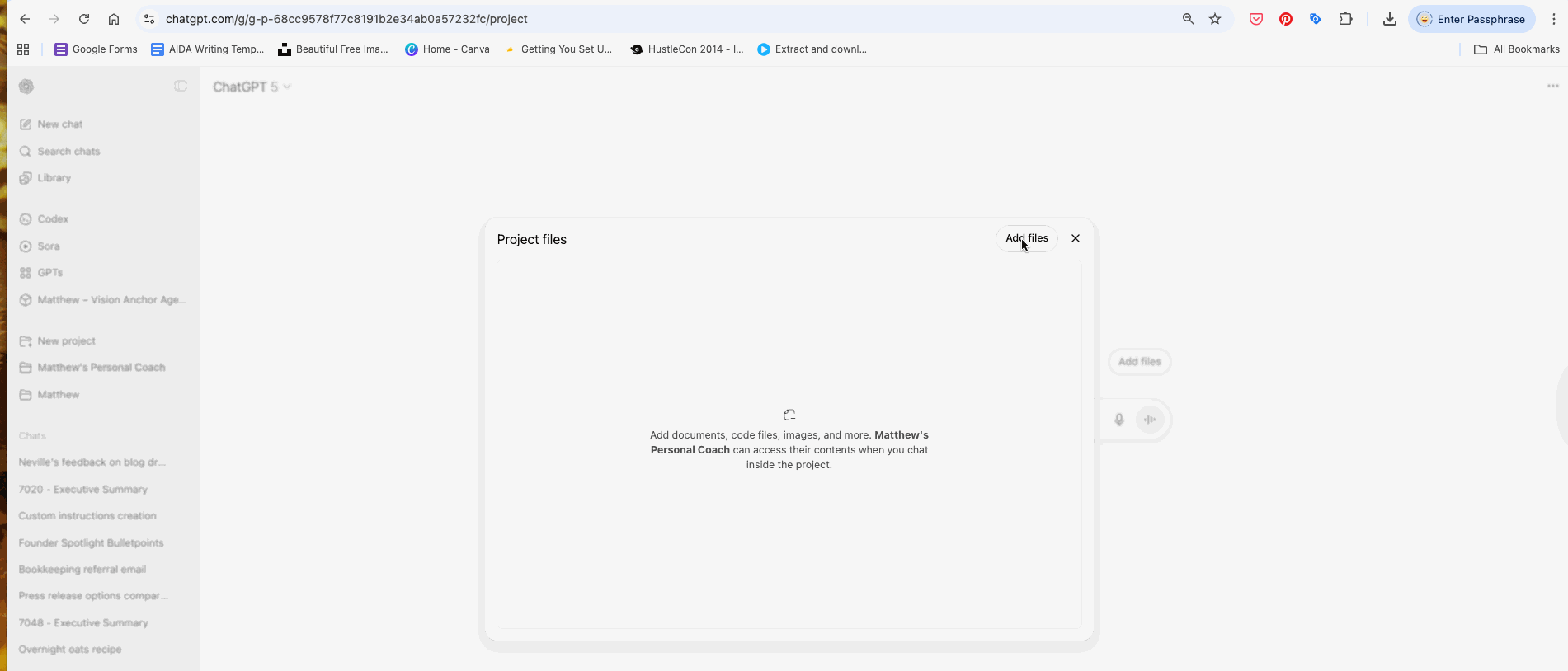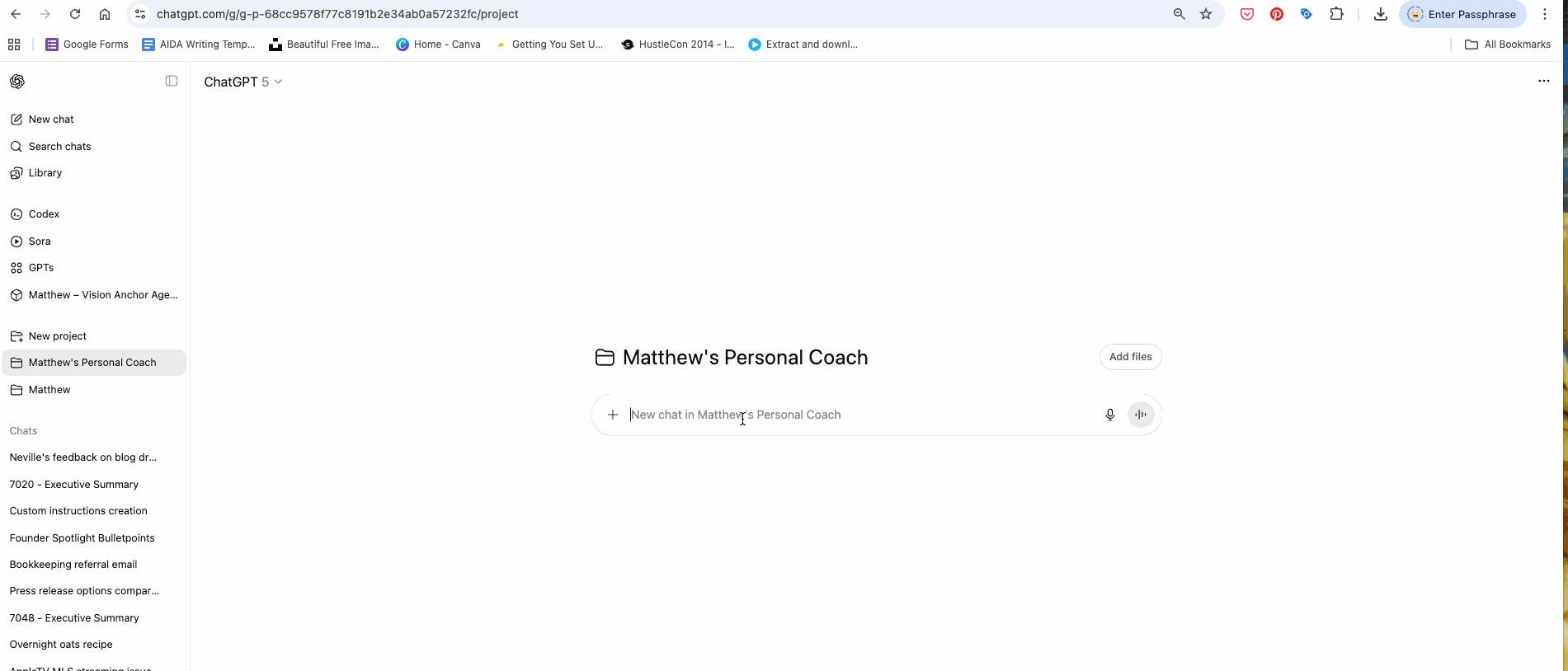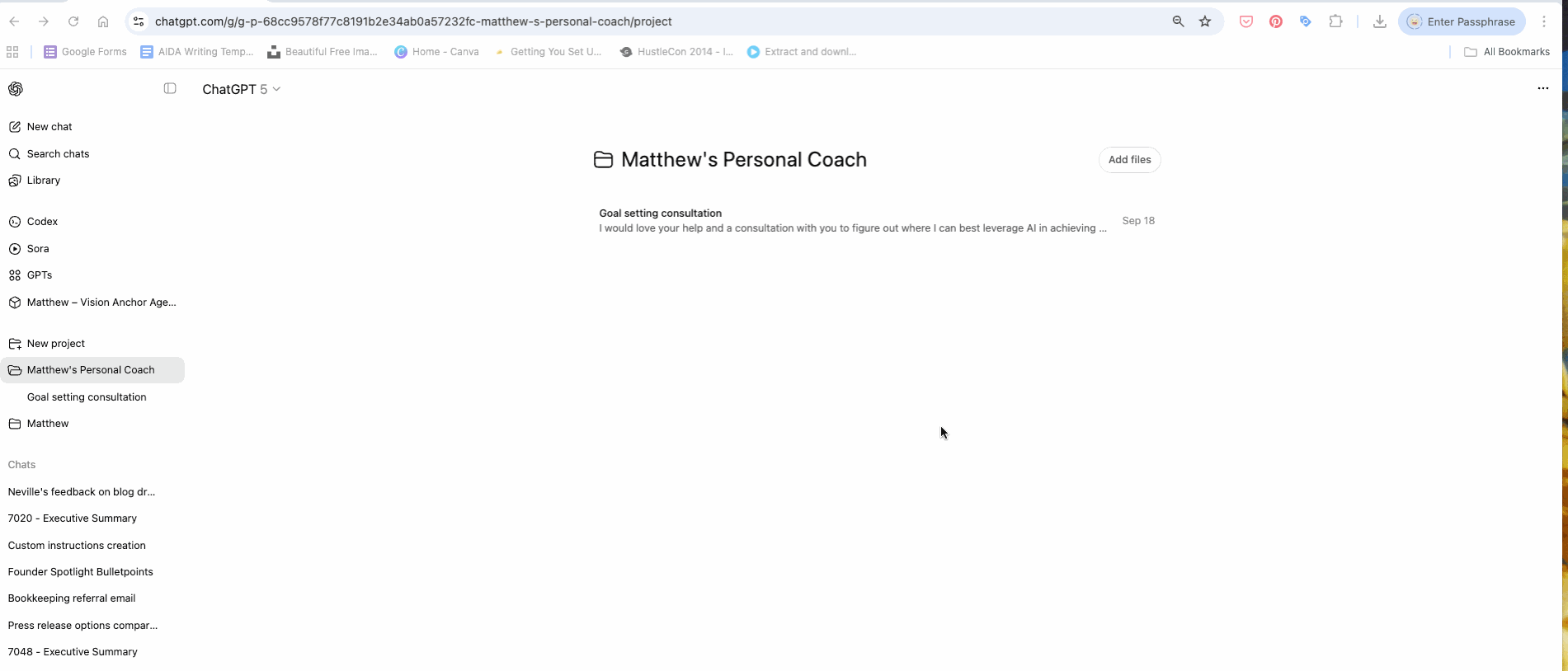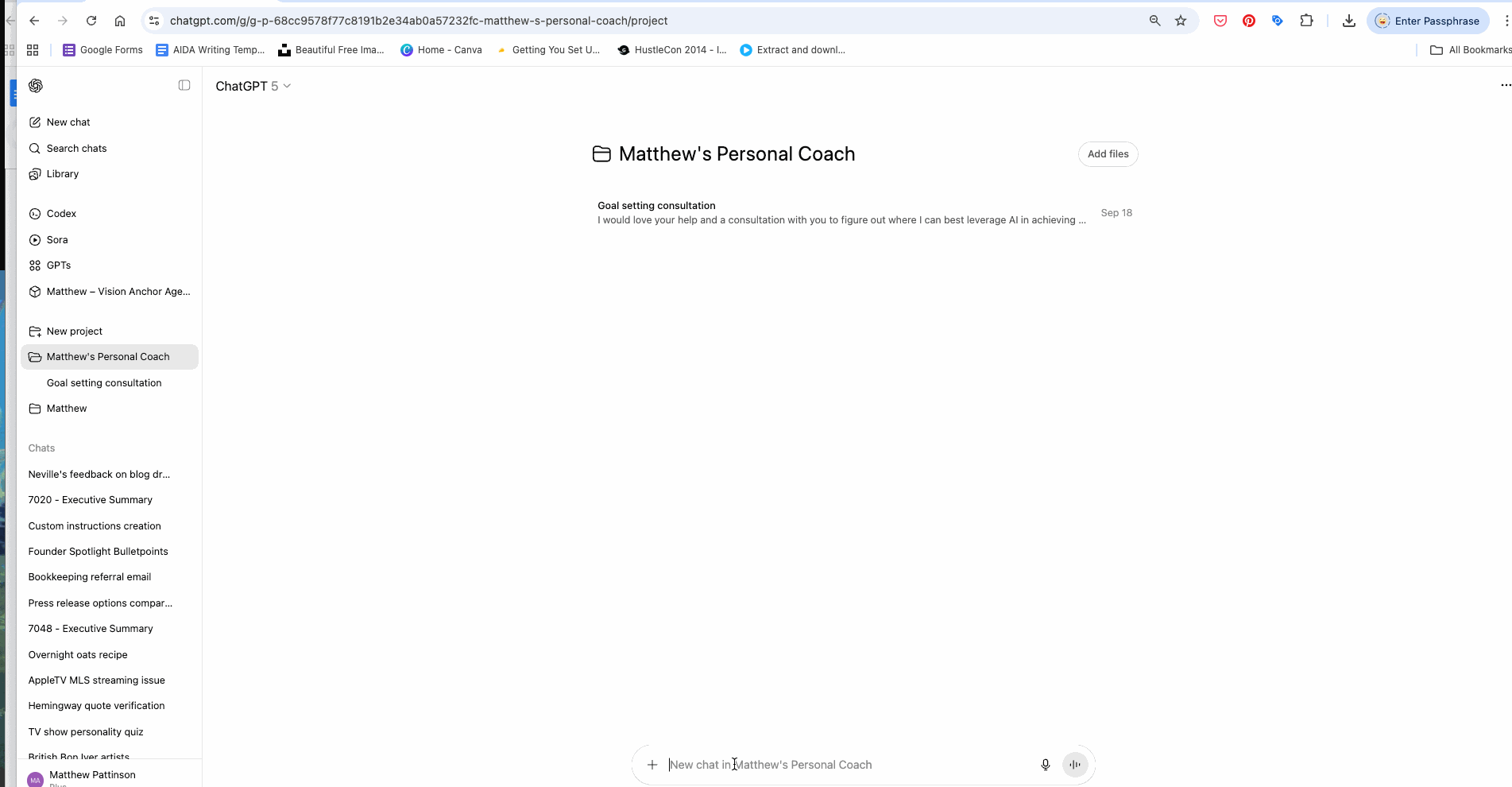Create Yourself A ChatGPT Accountability Coach (this got me from 20% to 68% consistency)
The Problem: 15 Years of Missed Goals
For 15 years, I wrote down personal goals…and never hit them. Work goals? Done. Personal goals? Still on the list years later.
I feared failure. I felt anxious. I felt guilty taking time for myself. I didn’t want to face the tradeoffs that achieving those goals demanded. So I avoided my own goals. I tried to fix it with journaling or meditation, hiring coaches, and reading countless self-help books. But it felt like those things were one more thing to do, and the results were short-lived.
A lot of my goals need consistency, and I wasn’t. My habit consistency for my most important habits (exercising, spending time on personal goals, getting to bed early, getting up early) has been less than 20% for years. Hard to call them habits when you don’t do them 80% of the time.
This year, I wanted to start making real progress. So I tried something different. And while I am not where I want to be yet, I am making progress. The something different is creating a personal folder in ChatGPT.
**A ChatGPT folder is just a hub: all your chats, docs, and rules in one place. That’s what turned ChatGPT from a search box into my personal coach.
The Breakthrough: ChatGPT as a Coach
At first, I used ChatGPT like an instant Google. Ask a question and get an answer. How can I manage worry? How do I stop negative self-talk? How can I develop a growth mindset? The answers were smart, but vague.
Then I realized that by giving ChatGPT my vision, personal philosophy, goals, and intentions, it could act as a coach by making concepts applicable to my life in that moment. It’s been eye-opening to see how well it has learned my patterns and flags them.
When I asked it to review my progress and identify what I need to focus on to achieve my goals, it nailed the pattern: my bedtime and wake-up times are the number one factor in my way. It showed me how much I accomplish when I’m consistent, and how quickly I slide into shame spirals when I miss the 5:30 a.m. wake-up.
It's not a surprise, but it hits harder when it comes from an outside source.
The Prompt That Built My System
I created a chat within my personal folder titled 'User Manual'. This is a chat that I use to help ChatGPT improve my system. I asked it for help with this prompt, which I adapted from Stanford Professor Jeremy Utley. I gave ChatGPT my:
Philosophy: my personal rules for how I show up at work, in relationships, and in free time (inspired by Dr. Michael Gervais & Pete Carroll).
Affirmations: daily reminders of how I want to live by that philosophy.
Vision & Goals: a 10-year vision broken into current-year and quarterly goals.
And then asked:
“I would love your help and a consultation with you to help me figure out where I can best leverage AI in achieving my goals and personal growth. To do this, I created the Matthew project folder. Review how I am currently using that folder, the chats I have, and the documents I have uploaded and ask me questions one question at a time until you have enough context to make two obvious recommendations and two non-obvious recommendations for how I should set up the folder and leverage AI to achieve my goals and improve my habits.”
No written goals? Paste This in ChatGPT:
I would love your help and a consultation with you to figure out where I can best leverage AI in achieving my goals, improving habits, and personal growth. I’m setting up a ChatGPT project to act as my personal goal and growth hub. I don’t have documents to upload, but I have ideas about my goals, habits, and intentions.
Please ask me questions one at a time about what I want to achieve, how I currently work with ChatGPT, and how I track my habits/goals. Once you have enough context, give me:
- Two obvious and two non-obvious recommendations for how to better use my project
- A set of SMART goals based on my answers.
A few back-and-forths later, I had a whole Playbook, basically the instruction manual for my coach.
Add Instructions, Get a Better Coach.
ChatGPT will happily pat you on the back all day and tell you that you are right. I needed more than that. I needed a coach who could call me on my BS. I needed focus. I needed accountability. That’s where setting up custom instructions in a personal folder comes in.
I borrowed ideas from other AI coach experiments, like these on creating a guide to find your purpose or a high-level coach. I also asked it for feedback in my ‘User Manual’ chat on what instructions would enable it to better act as a coach. Here are 6 of the rules I gave my AI coach (steal these if you want your ChatGPT to be more than instant Google):
Challenge any vague plans by asking me to define the exact time, place, and method (“When exactly will you do that?”)
If I’m looping, revisiting the same problem, question, or tactic without moving forward, point it out and help me choose one path to test.
Give me no more than two high-impact actions I can take immediately. Skip theory unless I ask. No templates unless they solve a specific blocker.
Track recurring tags (e.g., #avoidance, #momentum, #drift) and surface monthly patterns.
Support me while challenging me when I hesitate, resist, or fall into low-leverage work.
Help me identify work that doesn't serve my long-term goals. Push me to cut or delegate low-impact tasks.
One problem that kept derailing me: most mornings I’d sleep until 7:00 a.m. and the day collapsed. Exercise skipped. Personal goal blocks cancelled. And by the time my son went down to sleep, I was spent. Because I told the folder to give me one or two low-friction tactical nudges, it started replying with tiny, immediate actions I could actually do. Like this one:
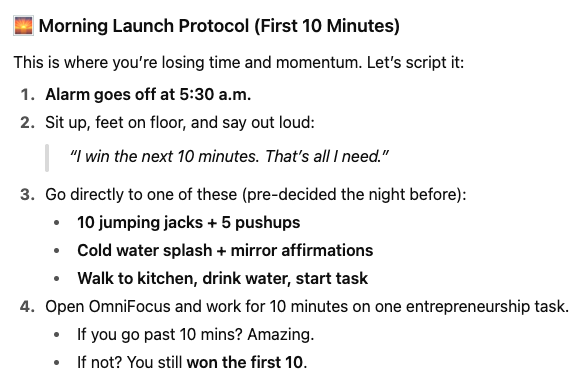
So I made a deal with myself: get up when the 5:30 a.m. alarm rings, do the scripted 10-minute pump-up routine, and I could do whatever I wanted after that. The reality is that if I win the first 10 minutes, the rest of the day usually follows.
Now that I had my coach, I needed the chats where my coach would help.
The Chats That Keep Me Accountable.
I knew that I wanted to work on my habits and mindset, make progress on my personal goals, and show up as the dad I want to be. But what chats to have came out of a conversation with ChatGPT in my ‘user manual’ chat. To add some structure here is what we ended up with for chats in my personal folder:
Mindset & Habits: where I troubleshoot my mental blocks and daily consistency.
Morning Intentions: a 2-minute daily setup to keep me grounded.
Weekly Review – Life Alignment: a space to measure my week against long-term goals.
Goal Experiments Chats: separate chats for goals where I get strategy help and simplify next steps.
Parenting: where I check myself against the dad I want to be.
User Manual: where I use ChatGPT to improve the system itself.
A favourite of mine that came from ChatGPT is the Morning Intentions chat. Every morning, I answer three quick questions about my intentions for the day:
What’s the one thing that matters most today?
What am I avoiding? (e.g., a task, a truth, or a decision I’ve been putting off)
Where do I need to stay consistent to get long-term results?
Then it gives me a mindset anchor for the day and 1 or 2 tactics to achieve my intentions. It primes a win for the day and is small, simple, and repeatable.
Here is an example of what one looks like:
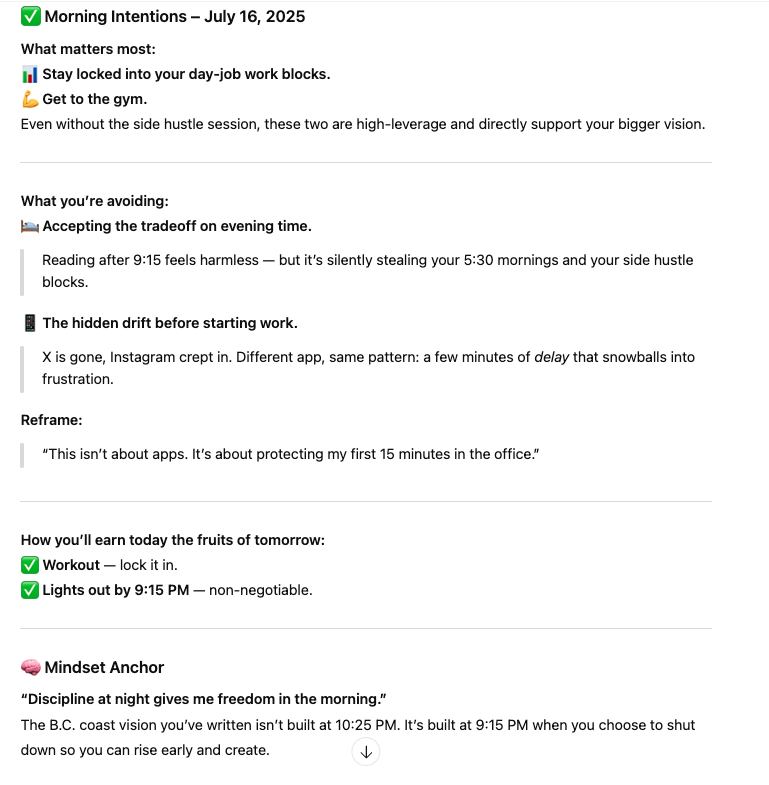
The bigger win is that I can ask it to review my responses over an extended period with a question like “What common situations or thoughts tend to trigger avoidance, hesitation, or low-leverage work in my Morning Intentions?”
Your coach in a Doc
Out of all the back-and-forth, we built one file: the Personal Folder Playbook. This is the operating system for my coach. Inside are the rules, routines, and tags that doubled my habit consistency. Here’s what’s in it:
The purpose of the personal folder
The three outcomes I want from ChatGPT as my coach
Custom rules for how it challenges me
My daily + weekly check-in structure
Tags to track my patterns (e.g. #drift, #momentum, #avoidance)
Want to see my whole Playbook? Grab it here free.
Results: 20% → 68% Habit Consistency
The turning point came with consistent use. Every day, I checked in: what went wrong in the first hour, where I drifted, and it would give me 1–2 quick actions I could actually use to get me back on track. Just as important, it gave me a place to dump the frustration and get it off my chest. Instead of spiralling, I bounced back faster.
Each check-in gave me one low-friction tactical nudge. Something small I could actually do, instead of overcomplicating things. And because I told ChatGPT to call out excuses and challenge vague plans, it learned my patterns. Over time, it started flagging when I was drifting and pushing me back on track. That’s accountability I never got from books or journaling.
The result? My habit consistency jumped from less than 20% to 68%. Still shy of my 80% goal, but for the first time, I’m showing up how I want, most of the time.
How to Build Your Own Folder (In 6 Steps)
Don’t take my word for it. Try it yourself in these six steps:
1) Create a Personal Folder in ChatGPT.
Click “New Project” in ChatGPT and name it.
2) Upload key documents (goals, affirmations, life vision).
Upload whatever you have written in documents about your life vision, goals, or intentions. If you have ideas in your head but nothing written, no problem. Go on to the next step.
3) Create your personal folder playbook.
In a new chat, paste one of these chats depending on your situation:
Have a written vision and goals? - Paste this into a new chat in your folder
I would love your help and a consultation with you to figure out where I can best leverage AI in achieving my goals, improving habits, and personal growth. I’ve already created a ChatGPT project to act as my personal goal and growth hub and uploaded documents with my defined goals, habits, or intentions.
Please review the documents and then ask me questions one at a time until you have enough context. Once you do, give me:
- Two obvious and two non-obvious recommendations for how to better use my project
- A set of SMART goals based on my uploaded material
No written vision or goals? Paste this into a new chat in your folder
I would love your help and a consultation with you to figure out where I can best leverage AI in achieving my goals, improving habits, and personal growth. I’m setting up a ChatGPT project to act as my personal goal and growth hub. I don’t have documents to upload, but I have ideas about my goals, habits, and intentions.
Please ask me questions one at a time about what I want to achieve, how I currently work with ChatGPT, and how I track my habits/goals. Once you have enough context, give me:
- Two obvious and two non-obvious recommendations for how to better use my project
- A set of SMART goals based on my answers.
4) Write 5–10 custom instructions that define how ChatGPT should coach you.
Click the ellipses in the top right corner and click “Add instructions.
Add 5-10 custom instructions to define how ChatGPT should coach you.
If you need help with this, in the same chat you had the consultation about setting up your personal project folder, drop this prompt:
Now that you’ve given me recommendations and SMART goals, I’d like your help creating 5–10 custom instructions that will define how this project folder should coach me.
- Ask me clarifying questions one at a time about the role I want ChatGPT to play (e.g., coach, accountability partner, creative collaborator, strategist, etc.).
- Use my answers plus the context from my goals, habits, and intentions to propose draft instructions.
- Each instruction should be written as a direct guideline for ChatGPT’s behaviour in this project folder (e.g., “Challenge vague plans by asking me to define exact time and place” or “Always remind me of my long-term goals when I drift into short-term distractions”).
- Make sure the set is specific, actionable, and tailored to me.
- Once you propose them, ask me to refine, add, or delete until we have a final list of 5–10 instructions.
5) Create separate chats for major areas (habits, parenting, mindset, weekly review).
Make separate chats for habits, mindset, parenting, and reviews. Recommendations for chats may come out of your conversation with ChatGPT.
6) Ask ChatGPT to summarize your coach into a Word doc
It isn’t about MY system. It’s about building a system that works for you. After your consultation, tell ChatGPT:
Summarize my system into a Playbook doc I can keep in my folder.
Now you’ve got your own operating manual. Drop it into your folder so your coach (and you) always have the rules in one place.
Take the Next Step
This is the exact file that took me from 20% to 68% habit consistency. Download it, steal the rules, and adapt it for your goals.
Want me to set up your system for you? Book a consultation and shortcut the trial-and-error.



